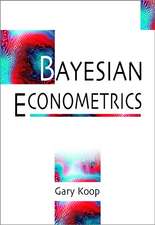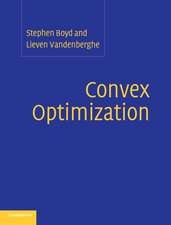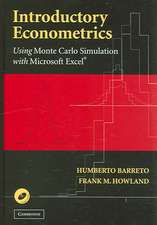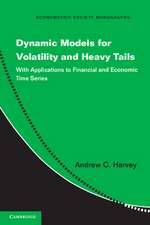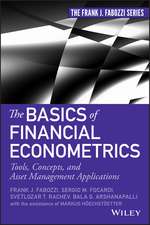Optimization Methods for Gas and Power Markets: Theory and Cases: Applied Quantitative Finance
Autor Enrico Edoli, Stefano Fiorenzani, Tiziano Vargioluen Limba Engleză Hardback – 15 ian 2016
Optimization Methods for Gas and Power Markets presents both theoretical elements and practical examples for solving energy optimization issues in gas and power markets. Starting with the theoretical framework and the basic business and economics of power and gas optimization, it quickly moves on to review the mathematical optimization problems inherent to the industry, and their solutions – all supported with examples from the energy sector. Coverage ranges from very long-term (and capital intensive) optimization problems such as investment valuation/diversification to asset (gas and power) optimization/hedging problems, and pure trading decisions.
This book first presents the readers with various examples of optimization problems arising in power and gas markets, then deals withgeneral optimization problems and describes the mathematical tools useful for their solution. The remainder of the book is dedicated to presenting a number of key business cases which apply the proposed techniques to concrete market problems. Topics include static asset optimization, real option evaluation, dynamic optimization of structured products like swing, virtual storage or virtual power plant contracts and optimal trading in intra-day power markets. As the book progresses, so too does the level of mathematical complexity, providing readers with an appreciation of the growing sophistication of even common problems in current market practice.
Optimization Methods for Gas and Power Markets provides a valuable quantitative guide to the technicalities of optimization methodologies in gas and power markets; it is essential reading for practitioners in the energy industry and financial sector who work in trading, quantitative analysis and energy risk modeling.
Preț: 723.04 lei
Preț vechi: 840.75 lei
-14% Nou
Puncte Express: 1085
Preț estimativ în valută:
138.40€ • 150.38$ • 116.33£
138.40€ • 150.38$ • 116.33£
Carte tipărită la comandă
Livrare economică 21 aprilie-05 mai
Preluare comenzi: 021 569.72.76
Specificații
ISBN-13: 9781137412966
ISBN-10: 1137412968
Pagini: 192
Ilustrații: XVII, 192 p.
Dimensiuni: 155 x 235 x 13 mm
Greutate: 0.48 kg
Ediția:1st ed. 2015
Editura: Palgrave Macmillan UK
Colecția Palgrave Macmillan
Seria Applied Quantitative Finance
Locul publicării:London, United Kingdom
ISBN-10: 1137412968
Pagini: 192
Ilustrații: XVII, 192 p.
Dimensiuni: 155 x 235 x 13 mm
Greutate: 0.48 kg
Ediția:1st ed. 2015
Editura: Palgrave Macmillan UK
Colecția Palgrave Macmillan
Seria Applied Quantitative Finance
Locul publicării:London, United Kingdom
Cuprins
1. Optimization in Energy Markets
1.1 Classification of optimization problems
1.1.1 Linear versus Nonlinear Problems
1.1.2 Deterministic versus Stochastic Problems
1.1.3 Static versus Dynamic Problems
1.2 Optimal portfolio selection among different investment alternatives
1.3 Energy Asset Optimization
1.3.1 Generation Asset Investment Valuation with Real Option Methodology
1.3.2 Generation, Transportation and Storage Asset Operational Optimization and Valuation
1.4 Energy Trading and Optimization
1.4.1 Asset allocation with Capital Constraints
1.4.2 Intraday trading
2. Optimization Methods
2.1 Linear Optimization
2.1.1 LP problems
2.2 Nonlinear Optimization
2.2.1 Unconstrained problem
2.2.2 Constrained Problems with Equality Constraints
2.2.3 Constrained Problems with Inequalities Constraints
2.3 Pricing financial assets
2.3.1 Pricing in energy markets
2.3.2 Pricing in incomplete markets
2.3.3 A motivating example: utility indifference pricing
2.4 Deterministic Dynamic Programming
2.5 Stochastic Dynamic Programming, discrete time
2.5.1 A motivating example
2.5.2 The general case
2.5.3 Tree methods
2.5.4 Least Square Monte Carlo methods
2.5.5 Naïve Monte Carlo with Linear Programming
2.6 Stochastic Dynamic Programming, continuous time
2.6.1 The Hamilton-Jacobi-Bellman equation
2.7 Deterministic numerical methods
2.7.1 Finite Difference Method for HJB equation
2.7.2Boundary conditions
2.8 Probabilistic numerical methods
2.8.1 Tree methods, continuous time
2.8.2 Computationally simple trees in dimension 1
2.8.3 Lattice of trees
2.8.4 Monte Carlo methods
3. Cases on Static Optimization
3.1 Case A: investment alternatives
3.2 Case B: Optimal generation mix for an electricity producer: a mean-variance approach
3.3 Conclusions
4. Valuing project's exibilities using the diagrammatic approach
4.1 Introduction
4.2 Description of the Investment Problem
4.3 Traditional evaluation Methods
4.4 Modelling Electricity Price Dynamics
4.5 Valuing Investment Flexibilities By Means Of The Lattice Approach
4.5.1 Investment alternative A
4.5.2 Investment alternative B
4.5.3 Investment alternative C
4.6 Conclusions
5. Virtual Power Plant Contracts
5.1 Introduction
5.2 Valuation Problem
5.2.1 Example
6. Algorithms comparison
The Swing Case
6.1 Introduction
6.2 Swing contracts
6.2.1 Indexed strike price modelling for gas swing contracts
6.2.2 The stochastic control problem
6.2.3 Dynamic Programming
6.3 Finite difference algorithm
6.3.1 Boundary conditions
6.3.2 The algorithm
6.4 Least Square Monte Carlo algorithm
6.4.1 The algorithm, and a reduction to one dimension
6.5 Naïve Monte Carlo with Linear Programming
6.6 Numerical Experiments
6.6.1 Finite differences
6.6.2 Least Square Monte Carlo
6.6.3 One year contract
6.7 Conclusions
7.Storage contracts
7.1 The contract
7.2 The evaluation problem
7.3 The optimal strategy (in the case of a physical gas storage)
7.4 The implementation
7.4.1 The gas cave
7.4.2 The gas spot price
7.4.3 The boundary conditions
7.4.4 Numerical experiment, no-penalty case
7.4.5 Numerical experiment, penalty case
8. Optimal Trading Strategies in Intraday Power Markets
8.1 Intraday power markets
8.1.1 Intraday power price features
8.1.2 Conclusions
8.2 Optimal Algorithmic Trading in Auction-Based Intraday Power Markets
8.2.1 The optimization problem
8.2.2 Example: Italian intra-day market
8.3 Optimal Algorithmic Trading in Continuous Time Power Markets
8.3.1 The optimization problem
8.3.2 Example: EPEX Spot market
1.1 Classification of optimization problems
1.1.1 Linear versus Nonlinear Problems
1.1.2 Deterministic versus Stochastic Problems
1.1.3 Static versus Dynamic Problems
1.2 Optimal portfolio selection among different investment alternatives
1.3 Energy Asset Optimization
1.3.1 Generation Asset Investment Valuation with Real Option Methodology
1.3.2 Generation, Transportation and Storage Asset Operational Optimization and Valuation
1.4 Energy Trading and Optimization
1.4.1 Asset allocation with Capital Constraints
1.4.2 Intraday trading
2. Optimization Methods
2.1 Linear Optimization
2.1.1 LP problems
2.2 Nonlinear Optimization
2.2.1 Unconstrained problem
2.2.2 Constrained Problems with Equality Constraints
2.2.3 Constrained Problems with Inequalities Constraints
2.3 Pricing financial assets
2.3.1 Pricing in energy markets
2.3.2 Pricing in incomplete markets
2.3.3 A motivating example: utility indifference pricing
2.4 Deterministic Dynamic Programming
2.5 Stochastic Dynamic Programming, discrete time
2.5.1 A motivating example
2.5.2 The general case
2.5.3 Tree methods
2.5.4 Least Square Monte Carlo methods
2.5.5 Naïve Monte Carlo with Linear Programming
2.6 Stochastic Dynamic Programming, continuous time
2.6.1 The Hamilton-Jacobi-Bellman equation
2.7 Deterministic numerical methods
2.7.1 Finite Difference Method for HJB equation
2.7.2Boundary conditions
2.8 Probabilistic numerical methods
2.8.1 Tree methods, continuous time
2.8.2 Computationally simple trees in dimension 1
2.8.3 Lattice of trees
2.8.4 Monte Carlo methods
3. Cases on Static Optimization
3.1 Case A: investment alternatives
3.2 Case B: Optimal generation mix for an electricity producer: a mean-variance approach
3.3 Conclusions
4. Valuing project's exibilities using the diagrammatic approach
4.1 Introduction
4.2 Description of the Investment Problem
4.3 Traditional evaluation Methods
4.4 Modelling Electricity Price Dynamics
4.5 Valuing Investment Flexibilities By Means Of The Lattice Approach
4.5.1 Investment alternative A
4.5.2 Investment alternative B
4.5.3 Investment alternative C
4.6 Conclusions
5. Virtual Power Plant Contracts
5.1 Introduction
5.2 Valuation Problem
5.2.1 Example
6. Algorithms comparison
The Swing Case
6.1 Introduction
6.2 Swing contracts
6.2.1 Indexed strike price modelling for gas swing contracts
6.2.2 The stochastic control problem
6.2.3 Dynamic Programming
6.3 Finite difference algorithm
6.3.1 Boundary conditions
6.3.2 The algorithm
6.4 Least Square Monte Carlo algorithm
6.4.1 The algorithm, and a reduction to one dimension
6.5 Naïve Monte Carlo with Linear Programming
6.6 Numerical Experiments
6.6.1 Finite differences
6.6.2 Least Square Monte Carlo
6.6.3 One year contract
6.7 Conclusions
7.Storage contracts
7.1 The contract
7.2 The evaluation problem
7.3 The optimal strategy (in the case of a physical gas storage)
7.4 The implementation
7.4.1 The gas cave
7.4.2 The gas spot price
7.4.3 The boundary conditions
7.4.4 Numerical experiment, no-penalty case
7.4.5 Numerical experiment, penalty case
8. Optimal Trading Strategies in Intraday Power Markets
8.1 Intraday power markets
8.1.1 Intraday power price features
8.1.2 Conclusions
8.2 Optimal Algorithmic Trading in Auction-Based Intraday Power Markets
8.2.1 The optimization problem
8.2.2 Example: Italian intra-day market
8.3 Optimal Algorithmic Trading in Continuous Time Power Markets
8.3.1 The optimization problem
8.3.2 Example: EPEX Spot market
Recenzii
Energy markets are extremely competitive markets. Optimization of business decisions is fundamental for performance maximization. This book represents an excellent synthesis of optimization theory and practice applied to a wide and significant range of cutting-edge business problems characterizing power and natural gas markets.'
- Domenico De Luca, CEO, Axpo Trading and Member of Executive Board Axpo Group
'Optimization methods play an important role when making decisions and managing risk in today's liberalized energy markets. When planning a power plant or entering a structured gas contract, stochastic control is the key mathematical tool to assess the inherent risk. The authors of this book present an excellent account of the problems and methods for optimization in energy and power markets. The scope ranges from a rigorous theoretical analysis of the control problems, through numerical methods and to in-depth discussions of relevant practical case studies. This book is unique in providing a solid mathematical analysis of various optimization problems, yet never losing the market practice out of sight. It will be an invaluable reference for both academics and practitioners in power and gas markets.'
- Fred Espen Benth, Professor of Mathematical Finance at the University of Oslo, Department of Mathematics and Deputy Manager
- Domenico De Luca, CEO, Axpo Trading and Member of Executive Board Axpo Group
'Optimization methods play an important role when making decisions and managing risk in today's liberalized energy markets. When planning a power plant or entering a structured gas contract, stochastic control is the key mathematical tool to assess the inherent risk. The authors of this book present an excellent account of the problems and methods for optimization in energy and power markets. The scope ranges from a rigorous theoretical analysis of the control problems, through numerical methods and to in-depth discussions of relevant practical case studies. This book is unique in providing a solid mathematical analysis of various optimization problems, yet never losing the market practice out of sight. It will be an invaluable reference for both academics and practitioners in power and gas markets.'
- Fred Espen Benth, Professor of Mathematical Finance at the University of Oslo, Department of Mathematics and Deputy Manager
Notă biografică
Enrico Edoli is Founder and CEO of Phinergy, a consulting firm which produces analytics and quantitative tools for energy trading and risk management. He has published several technical articles and a book related to quantitative energy finance. He is also Lecturer of a course in Mathematical Finance at the University of Padova. Enrico has a degree in Mathematics from the University of Padova, Italy and a PhD in Applied Mathematics from the same university.
Stefano Fiorenzani is a recognized expert in Energy Trading and Risk Management, with a career spanning numerous top European energy companies and financial institutions. He has published several scientific and business articles and three books on advanced methods in the energy finance area. Stefano is Founder and Chairman of Phinergy. He holds a degree in Economic Science, a Master of Science in Financial Economics and a PhD in Mathematical Finance.
Tiziano Vargiolu is Associate Professor of Probability and Statistics at the Department of Mathematics of the University of Padua, Italy, since 1998. There, he has taught courses on Probability, Statistics and Quantitative Finance at undergraduate, master's and PhD level, and directed PhD and master's theses in Financial Mathematics. His research interests span a wide range of topics including stochastic optimal control, pricing of contingent claims, portfolio optimization, interest rates models, credit risk and energy markets.
Stefano Fiorenzani is a recognized expert in Energy Trading and Risk Management, with a career spanning numerous top European energy companies and financial institutions. He has published several scientific and business articles and three books on advanced methods in the energy finance area. Stefano is Founder and Chairman of Phinergy. He holds a degree in Economic Science, a Master of Science in Financial Economics and a PhD in Mathematical Finance.
Tiziano Vargiolu is Associate Professor of Probability and Statistics at the Department of Mathematics of the University of Padua, Italy, since 1998. There, he has taught courses on Probability, Statistics and Quantitative Finance at undergraduate, master's and PhD level, and directed PhD and master's theses in Financial Mathematics. His research interests span a wide range of topics including stochastic optimal control, pricing of contingent claims, portfolio optimization, interest rates models, credit risk and energy markets.
Textul de pe ultima copertă
As power and gas markets are becoming more and more mature and globally competitive, the importance of reaching maximum potential economic efficiency is fundamental in all the sectors of the value chain, from investments selection to asset optimization, trading and sales. Optimization techniques can be used in many different fields of the energy industry, in order to reduce production and financial costs, increase sales revenues and mitigate all kinds of risks potentially affecting the economic margin. For this reason the industry has now focused its attention on the general concept of optimization and to the different techniques (mainly mathematical techniques) to reach it.
Optimization Methods for Gas and Power Markets presents both theoretical elements and practical examples for solving energy optimization issues in gas and power markets. Starting with the theoretical framework and the basic business and economics of power and gas optimization, it quickly moves on to review the mathematical optimization problems inherent to the industry, and their solutions – all supported with examples from the energy sector. Coverage ranges from very long-term (and capital intensive) optimization problems such as investment valuation/diversification to asset (gas and power) optimization/hedging problems, and pure trading decisions.
This book first presents the readers with various examples of optimization problems arising in power and gas markets, then deals withgeneral optimization problems and describes the mathematical tools useful for their solution. The remainder of the book is dedicated to presenting a number of key business cases which apply the proposed techniques to concrete market problems. Topics include static asset optimization, real option evaluation, dynamic optimization of structured products like swing, virtual storage or virtual power plant contracts and optimal trading in intra-day power markets. As the book progresses, so too does the level of mathematical complexity, providing readers with an appreciation of the growing sophistication of even common problems in current market practice.
Optimization Methods for Gas and Power Markets provides a valuable quantitative guide to the technicalities of optimization methodologies in gas and power markets; it is essential reading for practitioners in the energy industry and financial sector who work in trading, quantitative analysis and energy risk modeling.
Optimization Methods for Gas and Power Markets presents both theoretical elements and practical examples for solving energy optimization issues in gas and power markets. Starting with the theoretical framework and the basic business and economics of power and gas optimization, it quickly moves on to review the mathematical optimization problems inherent to the industry, and their solutions – all supported with examples from the energy sector. Coverage ranges from very long-term (and capital intensive) optimization problems such as investment valuation/diversification to asset (gas and power) optimization/hedging problems, and pure trading decisions.
This book first presents the readers with various examples of optimization problems arising in power and gas markets, then deals withgeneral optimization problems and describes the mathematical tools useful for their solution. The remainder of the book is dedicated to presenting a number of key business cases which apply the proposed techniques to concrete market problems. Topics include static asset optimization, real option evaluation, dynamic optimization of structured products like swing, virtual storage or virtual power plant contracts and optimal trading in intra-day power markets. As the book progresses, so too does the level of mathematical complexity, providing readers with an appreciation of the growing sophistication of even common problems in current market practice.
Optimization Methods for Gas and Power Markets provides a valuable quantitative guide to the technicalities of optimization methodologies in gas and power markets; it is essential reading for practitioners in the energy industry and financial sector who work in trading, quantitative analysis and energy risk modeling.
Caracteristici
The first of a number of new, cuttingedge references for the risk and pricing methodologies for the energy sector Written by an author team with academic and industry experience, bringing together industry application and experience with rigour and innovation Presents both theoretical elements and practical examples for solving energy optimization issues in gas and power markets














